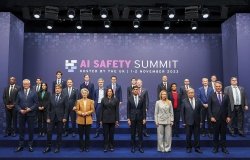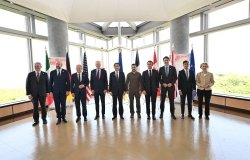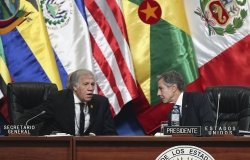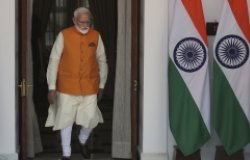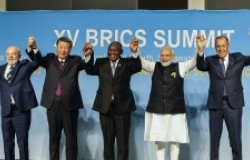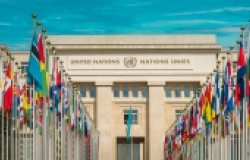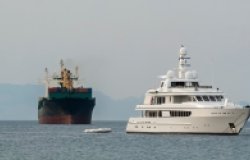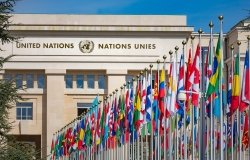Congress, the UN and the War Power: From Korea to Libya
Former C.I.A. director Porter Goss discuss Congressional war power in the context of U.S. military involvement in the NATO enforcement of the no-fly zone over Libya.
Overview
Panelists:
Porter Goss, Former U.S. Representative (R-Fla.), Former Director, CIA
John Yoo, Professor of Law, University of California-Berkeley Law School and former staff, Office of Legal Counsel, U.S. Department of Justice
Louis Fisher, Scholar in Residence, The Constitution Project
Jonathan Broder, Senior Editor for Defense & Foreign Policy, CQ Weekly
Moderator: Don Wolfensberger, Director, The Congress Project
"Congress doesn't declare war anymore," according to former congressman and C.I.A. Director Porter Goss, "and it doesn't exercise the power of the purse during wartime because that means denying money for the troops." The controversy over whose power is the war power "is a totally legitimate debate for Congress and the president to have," said Goss, "but there's never enough time to resolve it. There are always new brushfires breaking out that need to be dealt with."
Goss, who offered the keynote address at the May 16 Congress Project seminar, "Congress, the UN and the War Power: From Korea to Libya," said it's important to understand the context in which things are now happening: "the world is a mess, we are still a superpower and are asked to do a lot of things, partisan politics are harsher than ever, and conflicts between the president and Congress are as numerous as ever." Moreover, our whole understanding of what war is has been turned on its head with the new global war on terrorism. "This is different from World War II. Today we have an enemy that says, 'go ahead and kill me if I don't kill you first by blowing myself up."
Other members of the panel agreed with Goss that Congress does not do wars well, and prefers to defer to the president in crisis situations rather than share in the responsibility. Berkeley Law Professor John Yoo, a former Justice Department lawyer in the Office of the Legal Counsel, noted that the 60-day limit under the War Powers Resolution for deploying troops into hostilities without congressional approval expires on Friday, May 20 for the U.S. military involvement in the NATO enforcement of the no-fly zone over Libya. Although the president did submit a report to Congress on March 21 as required by the War Powers Act, and that set the 60-day clock ticking, he has not requested authorization from Congress to extend U.S. participation because he doesn't think he needs congressional approval. Like other presidents before him, he thinks the mandatory withdrawal provision of the War Powers Resolution is unconstitutional. Yoo said he agreed with the president that he could act unilaterally in the national interest under his authority as commander-in-chief and chief executive. However, Yoo noted that as a presidential candidate in 2007, Senator Barack Obama said he did not think the president could commit troops unilaterally unless we were attacked.
Louis Fisher, now a scholar in residence at the Constitution Project and previously a senior specialist on separation of powers at the Congressional Research Service for three decades, disagreed with Yoo that the president somehow has inherent powers to send U.S. troops to war except to repel a sudden attack on the U.S. Fisher says the Framers purposely reversed the war powers held by British monarchs and gave them to the U.S. Congress. While Congress no longer declares war, Fisher said, it has enacted use of force laws that have been upheld by the Supreme Court back in 1800 and 1801 as being equivalent to declarations of war. The most recent examples were the two Iraq war resolutions in 1991 and 2002, and the resolution to use force against those responsible for the 9/11 attacks in 2001.
Fisher said the UN participation Act of 1945, enacted to fulfill American commitments under the new United Nations Charter, made clear that any decision by the Security Council for the use of force would require congressional approval before American troops could be used. Yet five years later President Truman sent troops to Korea without asking Congress for authority, saying it was a "UN police action," not a war. Both Fisher and Yoo agreed that a UN Security Council authorization is no substitute for congressional authorization, though the president's letter to Congress on Libya specifically cites the authority granted by the UN as justification for American involvement.
Jonathan Broder, now a national security editor at CQ Weekly and a former foreign correspondent, said all the talk about laws and treaties is fine for academics, but as a journalist he prefers talking to those who are actually responsible for making the decisions about war and peace to learn how things work in the real world. While there has been a flurry of sense of Congress resolutions relating to Libya, no one has yet stepped forward with a resolution to authorize our military activities over Libya. The only committee actions have been two resolutions of inquiry reported by the House Foreign Affairs and Armed Services committees requesting documents from the State and Defense departments relating to Libya and consultation with Congress on the operation.
"When it comes to military operations," said Broder, "Congress tends to punt. It does not want to take a position when military defeat is a possibility." While one House member, Rep. Dennis Kucinich (D-Ohio) has threatened to introduce a resolution to force the withdrawal of U.S. forces from the Libyan air operation when the House returns from its recess May 23, Broder noted, it is unlikely to pass, just as his previous resolutions on Iraq and Afghanistan were defeated. However, even if it passed, the president would likely ignore it on grounds it was unconstitutional.
By Don Wolfensberger, Director, The Congress Project
Thank you for your interest in this event. Please send any feedback or questions to our Events staff.

